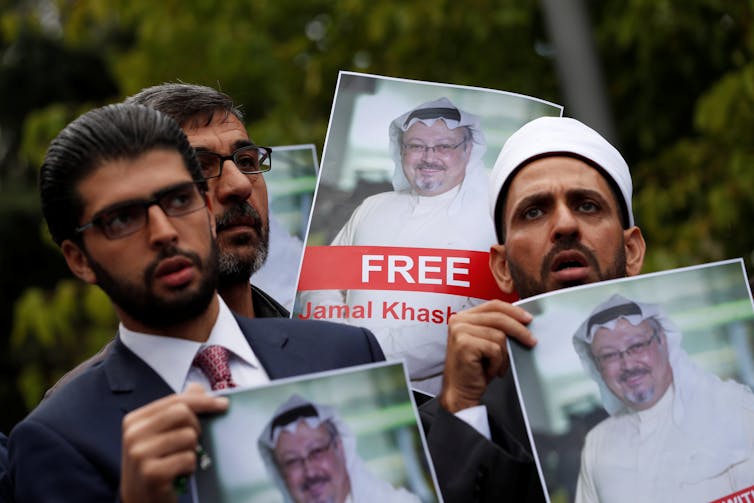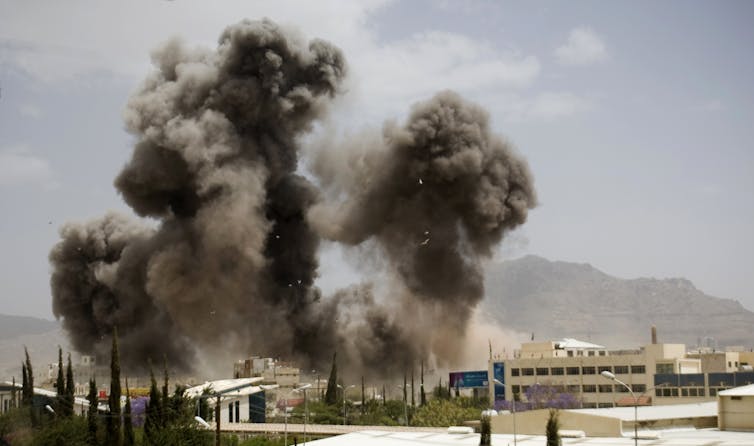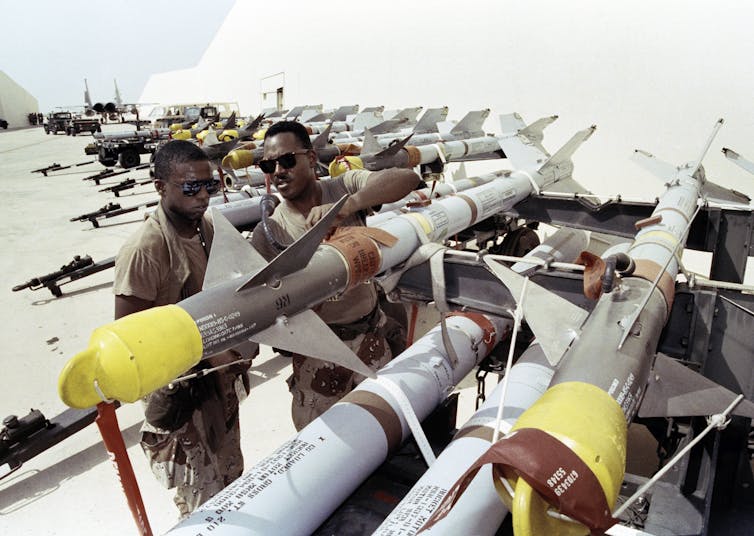Arms sales to Saudi Arabia give Trump all the leverage he needs in Khashoggi affair
- Written by Terrence Guay, Clinical Professor of International Business, Pennsylvania State University
Among Donald Trump’s many unusual characteristics as president is his frankness.
Last week, after the disappearance and apparent torture and murder of Washington Post columnist Jamal Khashoggi, Trump argued that “we would be punishing ourselves”[1] by canceling arms sales to Saudi Arabia over a human rights concern. Few world leaders, or former U.S. presidents, would have been so bold as to publicly admit that a Saudi journalist’s life is not worth the loss of arms sales.
And it’s true that the armaments relationship between these two countries is long-established and lucrative for U.S. companies, as my own research[2] on the global defense industry shows.
However, the president has it wrong when he argues the U.S. would be “foolish” to use these sales as leverage with the Saudis, claiming they could just get their tanks and fighter jets from other countries. In fact it’s one of the best bargaining chips he has with the kingdom.
 Human rights activists and friends of Saudi journalist Jamal Khashoggi hold his pictures during a protest.
Reuters/Murad Sezer[3]
Human rights activists and friends of Saudi journalist Jamal Khashoggi hold his pictures during a protest.
Reuters/Murad Sezer[3]
An arms-buying behemoth
Saudi Arabia is indeed a major weapons buyer.
Saudi Arabia spent[4] US$69.4 billion on military expenditures in 2017, according to the Stockholm International Peace Research Institute[5], the world’s leading research organization on conflict, armaments, arms control and disarmament. Only the U.S. and China spent more.
But since it doesn’t have an arms industry – like the U.S. and China – Saudi Arabia must import most of that from other countries. That’s why, over the past decade, Saudi Arabia has imported[6] more armaments than every country but India.
And U.S. companies such as Boeing, Lockheed Martin and Raytheon have benefited most from all that spending, making up the 55 percent[7] of its weapons imports from 2008 to 2017.
That has made Saudi Arabia the top buyer of American arms, with 11.8 percent of all sales over that period. In fact, U.S. defense contractors have made almost $90 billion selling[8] arms to Saudi Arabia since 1950.
In recent years, fighter planes like the F-15 and their spare parts have become particularly important[9] to the weapons trade with Saudi Arabia because it needs them to conduct[10] its bombing campaigns in Yemen.
For example, a 2011 contract[11] awarded $30 billion to U.S. defense contractors to produce 84 F-15 jets and other weaponry for the Saudi military. Boeing stands to earn $24 billion of this total, which the company claimed[12] will support over 50,000 U.S. jobs.
A bargain over human rights
As president, Trump clearly hopes that the money continues to pour in and helps him with his “America First[13]” campaign, intended to create jobs for Americans.
It’s no surprise, then, that he made his first foreign trip[14] as president to Saudi Arabia in May 2017. During the trip, he reportedly struck a bargain[15] with Saudi Crown Prince Mohammed bin Salman: Trump wouldn’t lecture his kingdom on human rights, and Saudi Arabia would buy more American weapons.
Unfortunately, Trump’s claim to have secured $110 billion in arms sales has not materialized. Although the Saudis signed numerous letters of intent and interest, some of which had been approved[16] by the Obama administration, no new contracts[17] have resulted, due mainly to lower oil prices and the Saudis’ costly war in Yemen.
So in the Khashoggi affair, it appears that Trump is eager to keep to his end of the bargain. He has avoided criticizing the Saudi government over its alleged role in Khashoggi’s disappearance to curry favor with the monarchy over arms sales. Even in the face of Turkish reports[18] that Saudi agents tortured Khashoggi and dismembered his body and U.S. intelligence supporting[19] those allegations, Trump has preferred to blame “rogue killers”[20] for any crime.
In defending this course of action, Trump claimed[21] that “if they don’t buy [weapons] from us, they’re going to buy it from Russia or they’re going to buy it from China or they’re going to buy it from other countries.”
 Smoke billows from a 2015 Saudi-led airstrike in Sanaa, Yemen.
AP Photo/Hani Mohammed[22]
Smoke billows from a 2015 Saudi-led airstrike in Sanaa, Yemen.
AP Photo/Hani Mohammed[22]
US leverage
While it’s true that Russia and China are indeed major exporters[23] of armaments, the claim that U.S. weapons can easily be replaced by other suppliers is not – at least not in the short term.
First, once a country is “locked in” to a specific kind of weapons system, such as planes, tanks or naval vessels, the cost to switch[24] to a different supplier can be huge. Military personnel must be retrained on new equipment, spare parts need to be replaced, and operational changes may be necessary.
After being so reliant on U.S. weapons systems for decades, the transition costs[25] to buy from another country could be prohibitive even for oil-rich Saudi Arabia.
The second problem with Trump’s argument is that armaments from Russia, China or elsewhere are simply not as sophisticated as[26] U.S. weapons, which is why they are usually cheaper – though the quality gap is quickly decreasing. To maintain its military superiority in the Middle East, Saudi Arabia has opted to purchase virtually all of its weapons from American and European companies.
That is why the U.S. has significant leverage in this aspect of the relationship. Any Saudi threat[27] to retaliate against a ban on U.S. arms sales by buying weapons from countries that have not raised concerns about the Khashoggi disappearance would not be credible. And is probably why, despite worries in the White House, such a threat has not yet been made.
 In many ways, Saudi Arabia is locked in to buying U.S. weapons such as missiles for F-15 fighters.
AP Photo/Scott Applewhite[28]
In many ways, Saudi Arabia is locked in to buying U.S. weapons such as missiles for F-15 fighters.
AP Photo/Scott Applewhite[28]
Selling ideals for short-term gains
Since the end of World War II, the U.S. has developed a global reputation as a moral authority[29] championing human rights.
Yes, there have been many times when realpolitik[30] took priority.
But despite these moments, the U.S. managed also to maintain its authority by advocating respect for human rights as a global norm during the Cold War, and within many repressive regimes ever since.
With Khashoggi, Trump is choosing to give up that mantle completely by showing his priority is purely economic, regardless of the impact on the United States’ global reputation[31]. Such a bald-faced strategy, in my view, sells American values short and weakens U.S. global credibility.
References
- ^ argued that “we would be punishing ourselves” (www.usatoday.com)
- ^ my own research (ssi.armywarcollege.edu)
- ^ Reuters/Murad Sezer (pictures.reuters.com)
- ^ Saudi Arabia spent (www.sipri.org)
- ^ Stockholm International Peace Research Institute (www.sipri.org)
- ^ has imported (armstrade.sipri.org)
- ^ 55 percent (armstrade.sipri.org)
- ^ selling (www.stripes.com)
- ^ important (www.npr.org)
- ^ conduct (www.theatlantic.com)
- ^ 2011 contract (www.washingtonpost.com)
- ^ claimed (www.cnn.com)
- ^ America First (www.bbc.com)
- ^ his first foreign trip (www.aljazeera.com)
- ^ struck a bargain (www.nytimes.com)
- ^ approved (www.brookings.edu)
- ^ contracts (www.brookings.edu)
- ^ Turkish reports (www.nytimes.com)
- ^ U.S. intelligence supporting (www.nytimes.com)
- ^ blame “rogue killers” (www.npr.org)
- ^ claimed (thehill.com)
- ^ AP Photo/Hani Mohammed (www.apimages.com)
- ^ indeed major exporters (www.sipri.org)
- ^ switch (doi.org)
- ^ transition costs (www.dtic.mil)
- ^ not as sophisticated as (ssi.armywarcollege.edu)
- ^ Saudi threat (fortune.com)
- ^ AP Photo/Scott Applewhite (www.apimages.com)
- ^ moral authority (thehill.com)
- ^ there have been many times when realpolitik (www.cnn.com)
- ^ reputation (www.pewglobal.org)
Authors: Terrence Guay, Clinical Professor of International Business, Pennsylvania State University

